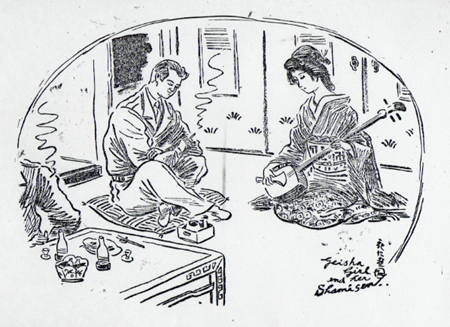|
Ah, the Geisha... (1947)

Text by Alvin Grauer. Illustration by Takamori Yakko."Here goes another American misconception! The real Geisha is a skilled specialized entertainer and her profession of trained artist (as well as courtesan) is quietly accepted by other Japanese.
The arts of the Geisha are the gentle arts of singing and dancing, of playing the Japanese guitar (samisen), of lively conversation, and, of course, of flattery to gentlemen guests. The morals of the successful Geisha are a matter of her own desire, and are occasionally quite high. The Geisha is not a prostitute. She may take a lover, or a gentleman of means to support her, but that is usually a pretty firm arrangement and gives her a status something like a "second wife".
The Geisha is a necessary institution in Japan where customs forbid husbands from going out socially with their wives. In larger cities, many young Japanese men and women disagree with this but the "Geisha Idea" still stays firmly rooted in Japanese culture.
The poverty of many Japanese families burdened with too many mouths to feed is what makes possible the social phenomena of the Geisha. For these girls are actually "indentured" for years to pay off the loans the Geisha Association advances to their parents. Too, many a poor farm girl joyfully accepts this chance to escape the misery of impoverished rural life in exchange for fine clothes and skilled training.
There are, of course, many levels to the "girl business" in Japan (as in practically every country). These include the "teahouse girl," who is a sort of free-lance, and the prostitute (joro) another "indentured" lady, also under a loan contract
that clearly specifies prostitution (frequently and incorrectly called a Geisha). Her plight is sad indeed. However, under the Occupation, SCAP has directed such contracts be declared illegal and they may no longer be written."
......................... From: Grauer, Alvin. So I Went to Japan. Tokyo: Nippon Times, 1947.
| 